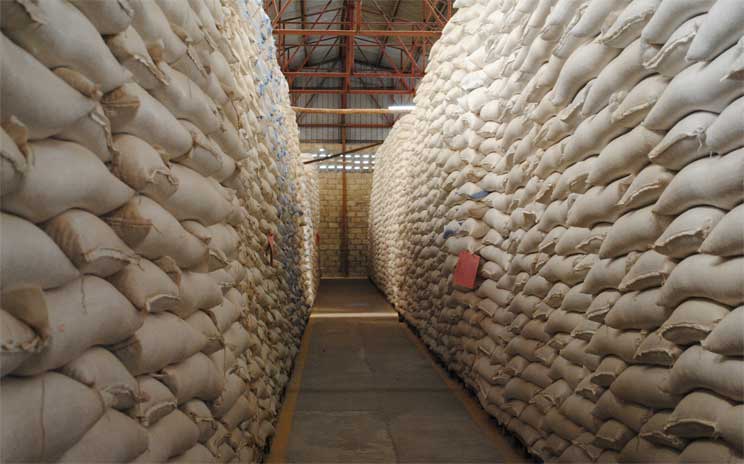
The regional states' and city administrations' mandate to issue import-export permits has been revoked by the Ministry of Trade & Regional Integration, which absorbed the service under the federal institution.
The centralisation of impex permit issuance was given to Tigray, Amhara, Oromia and Southern regional states, Dire dewa and Addis Abeba city administrations, as part of a pilot phase four years ago.
However, officials disclosed the backlogs due to understaffed offices prevented a smooth operation creating administrative gaps and delaying service provision. A rise in contraband trade has also been cited for the centralisation of impex permit issuance.
The new service entails a digital system which has been developed over the past year.
Head of Licensing Regulation at the Ministry, Jirata Nemera, said anyone in the country can access the online portal to obtain an import-export permit. He indicated that all permits and renewals are going to be conducted through the Ministry.
According to Jirata, this is a mere return to operational modalities four years ago with a digitised and efficient system.
"It'll make it convenient to customers," he told Fortune.
There are nearly 160,000 active import-export licenses in the country, with none given by federal authorities. The Addis Abeba City Administration accounted for three-quarters of the license.
Ethiopia's import bill has reached 4.5 billion dollars while its exports have declined by 14.9pc from last year, amounting to 778 million dollars.
While Jirata underscored the primacy of convenience for the change in modality, he acknowledged that the growing contraband trade was also a factor for the new procedure.
Contraband trade has proliferated significantly over the last few years, with the final year report by officials at the Ethiopian Customs Commission to Parliament revealing that 10.2 billion Br worth of merchandise was seized within the year.
They said the presence of armed groups in several regional states, along with ongoing conflict in neighbouring Sudan, have complicated administration around border areas, while exorbitant profit margins gained by using parallel exchange rates have fueled the problem.
The regional states were preparing to issue import-export permits, banking on their experience in the digital system for local trade licences.
Abdo Ali, head of inspection & monitoring in the Afar Regional State Trade Bureau, said that the region had been awaiting instructions from the federal government to start issuing import-export permits when it learned the whole thing was getting centralised.
The regional state was limited to helping authentication of documents in the past year as the Ministry issued licenses through the digital platform. Afar Regional State administered over 2,200 business licensing services throughout the year through the Ministry's digital platform.
Abdo said that centralisation through a digital platform will streamline the process but does not expect it to impact the contraband trade.
"It's conducted by actors far from the formal sector," he told Fortune.
According to Abdo, managing contraband requires an integrated effort across several regional states where border areas serve as possible entry and exit points.
Ease of Doing Business rankings compiled by the World Bank until 2021 had placed Ethiopia in the bottom 30 countries from 190. The index measures the amount of time and cost of obtaining permits to open a business, begin construction, access credit, and get electricity to assess the degree of difficulty in operating a business in a given country.
The Ministry's 11-month report stated that over 1.4 million services pertaining to issuance, registration, and renewals had taken place digitally during the year, of which around 250,000 were new business licenses. Amahara Regional State had outperformed in its use of the online portal, managing to provide over 600,000 services.
The digital platform, dubbed ETRADE, was developed by Custor Computing Plc and launched last July.
Since then, it has been welcomed by businessmen who loathe having to wait in queues for services at government bureaus.
Husni Ahmed, an importer of pharmaceutical supplies for the past five years, has found the digitisation in the issuance and renewal of permits to be a much-needed development.
"Not going to the offices by itself is a relief," he told Fortune.
The importer finds the centralisation of services to his convenience. But he recommends expanding digital literacy as most people in the business sector have little formal education.
Experts applaud the effort to go digital, although they are reserved about its efficiency.
Million Kibret, managing partner at BDO consulting, observed that despite increased efforts to facilitate business licensing services digitally over the past few years, a certain part of the process requires physical appearance.
While the consultant acknowledged the convenience provided by digitised centralisation, he fears that businessmen who reside in regional states will be required to come to the capital for certain procedures.
"A procedure is rarely completed online," he said.
PUBLISHED ON
Jul 15,2023 [ VOL
24 , NO
1211]

Radar | Oct 12,2024

Radar | Mar 30,2019

Radar | Sep 14,2024

Radar | May 27,2023

Fortune News | Sep 21,2019

Commentaries | Apr 15,2023

Fortune News | Jul 18,2021

Fortune News | Nov 17, 2024

Fortune News | May 17,2025

Fortune News | Nov 14,2020

Dec 22 , 2024 . By TIZITA SHEWAFERAW
Charged with transforming colossal state-owned enterprises into modern and competitiv...

Aug 18 , 2024 . By AKSAH ITALO
Although predictable Yonas Zerihun's job in the ride-hailing service is not immune to...

Jul 28 , 2024 . By TIZITA SHEWAFERAW
Unhabitual, perhaps too many, Samuel Gebreyohannes, 38, used to occasionally enjoy a couple of beers at breakfast. However, he recently swit...

Jul 13 , 2024 . By AKSAH ITALO
Investors who rely on tractors, trucks, and field vehicles for commuting, transporting commodities, and f...

Jul 12 , 2025
Political leaders and their policy advisors often promise great leaps forward, yet th...

Jul 5 , 2025
Six years ago, Ethiopia was the darling of international liberal commentators. A year...

Jun 28 , 2025
Meseret Damtie, the assertive auditor general, has never been shy about naming names...

Jun 21 , 2025
A well-worn adage says, “Budget is not destiny, but it is direction.” Examining t...